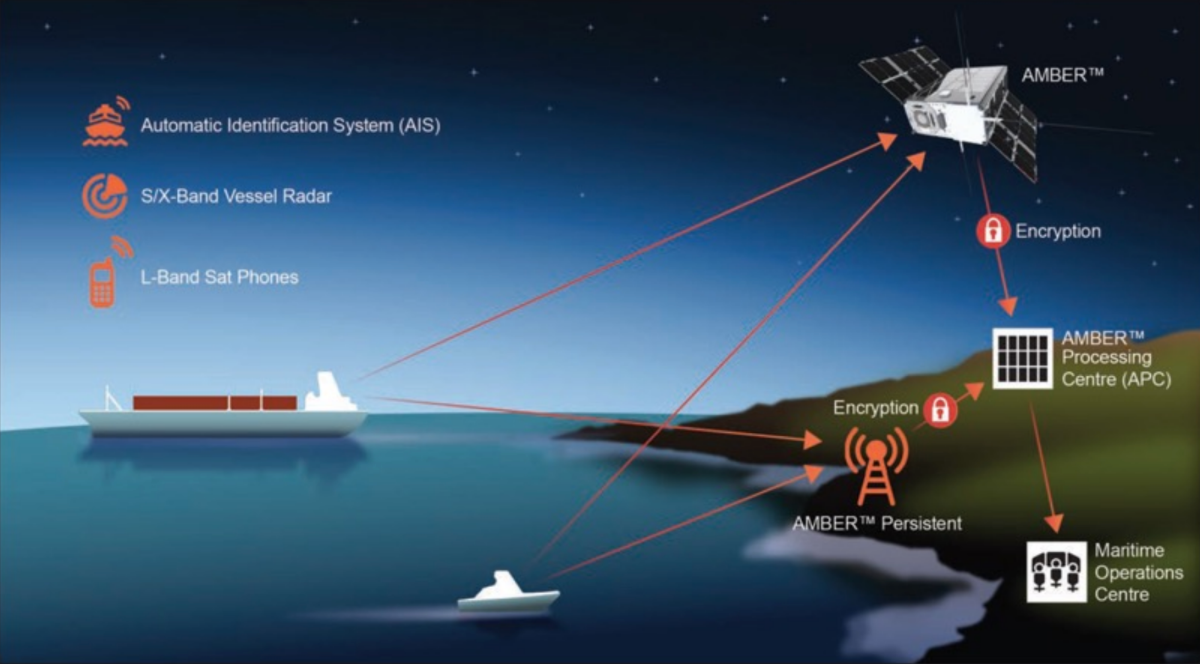
Horizon Technologies says its constellation will play a key role in detecting “dark vessels” engaged in activities including illegal fishing, smuggling, and those evading sanctions against countries such as Russia and Iran. Credit: Horizon Technologies
By Jason Rainbow,
Published by Space News, 19 October, 2023
TAMPA, Fla. — The U.K. is funding nearly half the cost of replacing the government-backed cubesat that British maritime surveillance venture Horizon Technologies lost in January in Virgin Orbit’s final launch attempt before bankruptcy.
Horizon said in an Oct. 19 news release that the UK Space Agency awarded the company a £1.2 million ($1.5 million) grant to help launch the spy satellite in mid-2024. The U.K. would use the replacement satellite to scan for radio frequencies (RF) from ships attempting to avoid detection.
Using revenues from equipping spy planes and drones to track satellite phones and radars, Horizon plans to provide the rest of the £2.8 million funding the Amber Phoenix satellite program needs to meet manufacturing, ground segment, launch, and other costs.
AAC Clyde Space (ACS) is building Amber Phoenix, the UK Space Agency announced separately, and a launch provider has not yet been booked. Publicly listed ACS is headquartered in Sweden but builds small satellites in Scotland.
John Becker, Horizon’s CEO, said Amber Phoenix would have undisclosed improvements over the lost Amber IOD-3 (In-Orbit Demonstration) satellite that ACS also provided.
Amber IOD-3, a 6U cubesat like its successor, was part of a program led by British government-backed nonprofit Satellite Applications Catapult that used Horizon as a prime contractor.
Becker told SpaceNews Horizon spent more than £4 million on the technology needed for what was to be its first satellite, supported by a £600,000 grant from U.K. government’s innovation agency.
The uninsured Amber IOD-3 was one of nine small satellites lost when Virgin Orbit’s Launcher One failed to reach the proper orbit in its first and only launch from British soil. Virgin Orbit collapsed into bankruptcy three months later.
Bad launch bet
Horizon had initially planned to launch Amber IOD-3 aboard a SpaceX Cargo Dragon mission in 2021 for deployment from the International Space Station.
After missing this launch opportunity following pandemic-related production delays, Becker said Amber IOD-3 was moved to Virgin Orbit partly to support its first U.K. launch.
Amber IOD-3 was originally due to launch with Virgin Orbit in July 2022, he added, but was delayed while the launcher sought permission to fly from the United Kingdom.
Without the grant from the UK Space Agency to partly fund a replacement satellite, Becker said Horizon would have had to shut down plans to expand its business into space.
Horizon ordered two other Amber surveillance satellites from ASC in 2021, initially slated to launch in 2022 but also suffered production delays.
Only preliminary work has been done on these cubesats, according to Becker, and the company expects to announce a deployment date for them once a launch provider has been nailed down for Amber Phoenix.
Horizon envisages a constellation of more than 20 Amber payloads in low Earth orbit, enough to provide worldwide RF data with 30-minute latency.
The U.K. Royal Navy’s Joint Maritime Security Centre (JMSC) plans to use the constellation to tackle piracy, smuggling, and other illegal activities.
Becker said Horizon is seeking to sell its space-based detection services to other governments and commercial customers.
He said the constellation will also include RF-tracking payloads integrated into partner Earth observation and synthetic aperture radar (SAR) constellations.
Sensors on these constellations could be tasked to capture more data on areas RF payload has identified as of interest.
Horizon has a memorandum of understanding with a U.S.-based Earth observation company to add payloads on satellites due to launch next year, Becker added, and is closing in on a deal with a separate SAR company.
See: Original Article




